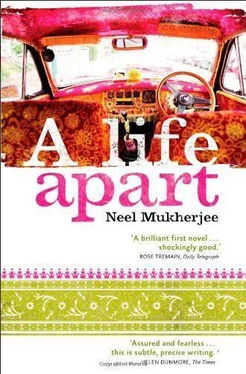‘They seem to be mostly food places.’
‘You eat Arabic food? You like?’ An enthusiasm flared up in Saeed like the brief flash of a match.
Ritwik, who went partially hungry most days unless Mrs Haq called him over and fed him or sent him little tupperware boxes of kebabs, dal bukhara and bhindi gosht , replied feebly, ‘No, I don’t know Arabic food but I’d love to try some.’ His curiosity and greed for food, especially unknown cuisines, was unbounded and haunting.
To Ritwik, the conversation had become a parody: here he was with an unknown Libyan man, driving him to an unknown destination, and he was sitting politely and giving quintessentially English answers — ‘Yes, please’, ‘No, but I’d love to’ — non-committal and unrevealing, while the real questions bobbed and swelled inside him, his curiosity still sharp and unsatisfied.
How did Saeed meet Mr Haq? What sort of work did he do for the older man? Why did Saeed drive such a flash car? What did he do by way of earning money? Why did Ritwik get the impression that whatever Saeed did, it wasn’t wholly conventional or licit? Why did he have an uneasy sense that Saeed’s money wasn’t white, clean or regular?
The blue had lightened to the pre-dawn grey, which held the promise of another unbrokenly cloudless and hot day. Outside, the scene had changed radically again. Ritwik was going to discover this abiding aspect of London: with one corner turned or a side-street stepped into, the whole landscape could change, from Georgian terrace to postwar prefab, tree-lined red brick suburbia to outbreaks of high-rise council estate rashes with cruel names to their buildings: Ullswater, Windermere, Grasmere, Keswick. The demarcations were sudden and jagged. Even the immigrant quarters changed, as Saeed pointed out driving down Finchley Road, ‘The Jewish people live here.’ This was his first voluntary statement, after Buckingham Palace, about an area of London; Ritwik wondered if the two held equal, not identical, significances in his mind.
‘We come near the place,’ Saeed volunteered. They passed an underground station: Willesden Green. He drove on for a few minutes, turned left on Anson Road and parked his car.
‘We go out.’ Saeed leaned forward and sideways to open the door for Ritwik, a gesture he found touching and old-fashioned. It was nearly light and the dawn was cool; Ritwik was glad of his thin jumper.
‘We walk there. Not far, five minutes. We don’t take car there.’ Saeed was becoming almost talkative.
They went back to the main road, Chichele Lane. After a few minutes, Ritwik noticed disparate groups of people. It wasn’t as if the journey here had been through utterly deserted streets, but after their relative emptiness, this seemed positively crowded. Men, mostly, standing in little groups, chatting, smoking, huddled, as if sharing a secret or a shame. A few were standing on their own. There were even two women, one with a sleeping baby wrapped around her front in folds and folds of cloth, another one, standing with a pale man, both smoking.
‘We stand here. No, not so far,’ he said, as Ritwik tried to go further on, right in the middle of these stray clumps of people. ‘Here, here is OK.’
Without even thinking, Ritwik marked he was the only person there who was not white. He didn’t have a clue from where these people, standing around disjointedly at this unholy hour of the morning, came, or why they were all gathering here. A queue was forming of men who seemed to speak to each other in the same language. Some of them appeared to know each other. Three men stood out. Like Saeed, two of them wore branded clothes and shoes, either real Nikes, Pumas and Filas or fakes. They had heavy chains around their necks and wore bracelets and rings. One of them had thick golden hoops in his earlobes. They smoked and patrolled the street and the people. Most of the people gravitated to these three men who were more loquacious, more confident than the rest: they were like teachers with their group charges on a school trip. The men chatted, laughed occasionally, sized up the two women. There was a tense furtiveness in the way people looked, or refused to look, at each other, an uneasy expectation, a hairline crack of suspicion and something else Ritwik couldn’t quite place.
Before Ritwik’s questions tumbled out, Saeed started speaking. ‘They workers, look for work here every morning. This place Job Street. From many places. Russia, Albania, Romania, Croatia, Montenegro’ — Ritwik noted both his surprise and his prejudice at hearing Saeed reel off the names of unusual countries — ‘Yugoslavia.’
But that country doesn’t exist anymore . A red double-decker bus passed by, bringing the scatter of people together on the pavement. As soon as it was gone, they started unravelling to their former loose alignments. Every time a car or van went down the road, the men stared at it, poised on the edge of some anticipation, almost willing it to stop. A man, darker than the rest, came up to Saeed and spoke to him. The language was unknown to Ritwik but it was obvious what it was from the opening Salaam aleikum . They carried on talking seriously, the language oddly guttural and glottally stopped, with its halting music of sibilants and aspirants joined together. Saeed nodded, the man walked off and returned two minutes later with two young women, girls really; they looked as if they were still in their teens but with a precocious air of composure and resignation about them. They didn’t look up or acknowledge anyone’s presence. Saeed didn’t bother speaking to them; he continued talking to the man. After a while, the man nodded, shook Saeed’s hand and walked off.
Ritwik didn’t know how these axes were forming in the first place but it seemed to him that Saeed was now in charge of three people, the two girls and Ritwik, just as the three flash men had gathered together their individual groups. Two more young men, obviously known to Saeed, came and joined their growing cluster. Saeed spoke to them in English.
‘Hello. We wait for them now. You work in East Anglia or Cambridgeshire today?’
One of the men, lean, blotchy-faced, with gnarled, veined hands, replied, ‘They take us. We don’t know. We go where they take us.’ His English was heavily accented but in a very different way from Saeed’s. Ritwik felt frustrated he couldn’t place any one of these people but if he were asked to guess the origins of the two new arrivals, he would have put it down to the eastern fringes of Europe, or one of the former Soviet dominions. Some of the men waiting here were so astonishingly beautiful that his eyes kept wandering. Dark hair, fair skin, lean faces, and unreadable, opaque, dark eyes with long lashes. A few others were bony, with spun straw hair, or dark curls, high cheekbones, a throwaway grace to their movements.
Suddenly there was a stir as some men ran forward to a white truck, which had appeared cruising slowly along the road. Saeed said, ‘Not our work, not us. Stay here.’ The men, seven or eight of them, who crowded around below the driver’s door were scrambling and jostling with each other. Two of the bejewelled men were trying to hold them back and talk to the driver at the same time. From where Ritwik stood, he could neither see the driver nor hear what was going on. After a few minutes of conversation between these men, punctuated by one thickset man trying to push his way to the front and put his hand up through the driver’s window, the leaders stepped back and picked out three men each. The truck driver opened his door, jumped out, and spoke to the leaders. Three of the men who had joined in the scramble when the truck had arrived on the scene went around the front of the vehicle and got in through the passenger door. The driver did a high five with the man with earrings, got into the truck and drove off. Two minutes later, a large white van came up and stopped as the other leader indicated to it, waving his hand. There was a brief conversation with him, the driver stepped out, opened the back door and let the three other men in. Before he drove off, he reached into his pocket, took out a few notes and gave it to the man who had stopped his van.
Читать дальше












